|
|
|
Sort Order |
|
|
|
Items / Page
|
|
|
|
|
|
|
| Srl | Item |
| 1 |
ID:
144292
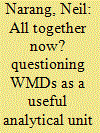

|
|
|
|
|
| Summary/Abstract |
The popular use of the term “weapons of mass destruction” (WMD) can be understood to imply a relationship between nuclear, chemical, and biological weapons proliferation insofar as it assumes that the separate weapons technologies can be usefully grouped into a single analytic category. This article explores whether WMD is actually a useful construct. It begins by reviewing the literature on nuclear, chemical, and biological weapons proliferation, including a recent study that sought to estimate the relationship between the pursuit and acquisition of these different weapons. It then explores some policy inferences that academics and policy makers may be tempted to draw from these studies, particularly regarding the Barack Obama administration's pursuit of deep nuclear reductions. It argues that many of these policy inferences are premature at best and misleading at worst. It concludes with a call for additional research into the causes and consequences of chemical and biological weapons proliferation, and a call for scholars to remain cautious in their desire to draw premature policy implications from their studies in order to be “policy relevant.”
|
|
|
|
|
|
|
|
|
|
|
|
|
|
|
|
| 2 |
ID:
138309
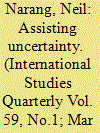

|
|
|
|
|
| Summary/Abstract |
Humanitarian aid has rapidly emerged as a core component of modern peacebuilding and post-conflict reconstruction. However, some practitioners and policymakers claim that humanitarian assistance may actually prolong conflict. The current debate about the effect of humanitarian aid on conflict underspecifies causal mechanisms and takes place largely through case studies. I use a bargaining framework to argue that aid can inadvertently increase each combatant's uncertainty about the other side's relative strength, thereby prolonging civil war. I test my argument using panel data on cross-national humanitarian aid expenditures. From 1989 to 2008, increased levels of humanitarian assistance lengthen civil wars, particularly those involving rebels on the outskirts of a state. This result suggests that policymakers need to carefully consider whether the specific benefits provided by humanitarian aid outweigh the risk of prolonging civil conflicts, and to look for methods of disbursement that reduce that risk.
|
|
|
|
|
|
|
|
|
|
|
|
|
|
|
|
| 3 |
ID:
157550
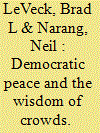

|
|
|
|
|
| Summary/Abstract |
This article proposes a new theory for the democratic peace that highlights a previously unexplored advantage enjoyed by democracies in crises. We argue that because democracies typically include a larger number of decision-makers in the foreign policy process, they will produce fewer decision-making errors in situations of crisis bargaining. Thus, bargaining among larger groups of diverse decision-makers will fail less often. In order to test our hypothesis, we use data from experiments in which subjects engage in ultimatum bargaining games. We compare the performance of individuals, small groups and foreign policy experts against the performance of larger groups of decision-makers. We find strong support for the idea that collective decision-making among larger groups of decision-makers decreases the likelihood of bargaining failure.
|
|
|
|
|
|
|
|
|
|
|
|
|
|
|
|
| 4 |
ID:
167672
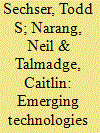

|
|
|
|
|
| Summary/Abstract |
Recent commentary has sounded the alarm about the effects of emerging technologies on strategic stability, yet the topic has received relatively little systematic scholarly attention. Will emerging technologies such as cyber, autonomous weapons, additive manufacturing, hypersonic vehicles, and remote sensing make the world more dangerous? Or is pessimism unwarranted? In this volume, we leverage international relations scholarship, historical data, and a variety of methodological approaches to discern the future implications of new technologies for international security. The findings suggest that new technologies can have multiple, conditional, and even contradictory effects on different aspects of strategic stability, and raise a host of important questions for future research.
|
|
|
|
|
|
|
|
|
|
|
|
|
|
|
|
| 5 |
ID:
166000
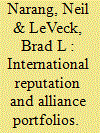

|
|
|
|
|
| Summary/Abstract |
Why do states ever form military alliances with unreliable partners? States sign offensive and defensive military alliances to increase their fighting capabilities in the event of war and as a signal to deter potential aggressors from initiating a crisis. Yet, signing an alliance with an unreliable partner is at odds with both of these rationales. This should be particularly concerning for peace scholars and policymakers, since the uncertainty generated by unreliable partners may increase system-wide conflict. This article provides an answer to this puzzle by arguing that states continue to form alliances with unreliable partners because they can adopt rational portfolio-diversification strategies. Drawing on well-developed models from portfolio theory, we present evidence that states design their overall alliance portfolios to minimize the risks posed by allies with a reputation for being unreliable. Specifically, we show that unreliable allies are more likely to be pooled into multilateral alliances that dilute risk rather than bilateral alliances, and that states allied with unreliable partners form a greater number of alliances to hedge against the added risk of default. Together, our results demonstrate why unreliable partners may not lead to increased conflict initiation, while also providing a novel explanation for previously unexplained variation in the structure of alliance portfolios. The article contributes to the literatures on international reputation and the rational design of international institutions by demonstrating how international reputation matters in subtle and often overlooked ways.
|
|
|
|
|
|
|
|
|
|
|
|
|
|
|
|
| 6 |
ID:
131241
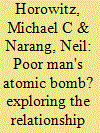

|
|
|
|
|
| Publication |
2014.
|
| Summary/Abstract |
The causes and consequences of nuclear proliferation have received a great deal of academic attention. However, nuclear weapons are rarely discussed in isolation in policy circles. Instead, nuclear weapons are relevant as part of a category of weapons of mass destruction (WMDs) that includes chemical and biological weapons (CBWs). Are the factors that drive CBWs proliferation similar to those that drive nuclear proliferation? What is the relationship between these weapons types? In this article, we explore whether nuclear weapons and CBWs serve as complements or substitutes. Using newly collected data on both CBWs pursuit and possession over time, we find that nuclear, biological, and chemical weapons generally function as complements at the pursuit stage. In addition, countries that acquire nuclear weapons become less interested in pursuing other types of WMDs and are even willing to give them up in some cases.
|
|
|
|
|
|
|
|
|
|
|
|
|
|
|
|
| 7 |
ID:
153909


|
|
|
|
|
| Summary/Abstract |
Why do armed groups ever direct violent attacks against humanitarian organizations? While scholars have analyzed wartime violence against civilians, little research exists on violence against other noncombatants, like humanitarian organizations. Violence against aid workers, however, is common in wartime, with devastating consequences for civilians, who suffer when aid organizations respond by reducing services. This article argues that much of the violence against humanitarian organizations is strategic. By serving as substitute providers of public goods, aid organizations can bolster the government. Insurgents thus target aid workers in an effort to force them out of particular regions, undermining government support. To test this argument, we analyze variation in violence across space and time using an original panel dataset on attacks against aid workers in Afghanistan, 2008–2012. Despite aid organizations’ attempts to remain neutral, we find evidence that insurgents strategically target aid workers in areas where their services likely strengthen government support.
|
|
|
|
|
|
|
|
|
|
|
|
|
|
|
|
| 8 |
ID:
163452
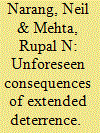

|
|
|
|
|
| Summary/Abstract |
Do “nuclear umbrellas” create a moral hazard that can increase the risk of war? In this article, we investigate whether situations of extended deterrence in which a nuclear patron makes a defensive commitment to a nonnuclear client state can inadvertently increase the likelihood that a client will initiate a crisis with another state. Using data on the crisis behavior of states from 1950 to 2000, we estimate the impact of a nuclear umbrella on various crisis outcomes, including the initiation and escalation of militarized conflict. Interestingly, we find no evidence that such commitments increase the risk of war or even two-sided violence at lower levels. However, consistent with both the moral hazard logic and bargaining theories of war, we show that this appears to be because potential target states offer increased policy concessions to client states to avoid costly fighting. Thus, the link between nuclear umbrellas and moral hazard appears to be real, but it is reflected in the division of benefits rather than a greater likelihood of war. The results have important policy implications as the US contemplates extending its nuclear umbrella.
|
|
|
|
|
|
|
|
|
|
|
|
|
|
|
|
|
|
|
|
|